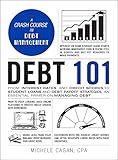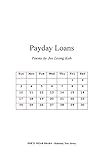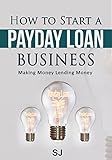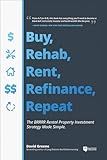Best Payday Loan Guides to Buy in November 2025

Debt 101: From Interest Rates and Credit Scores to Student Loans and Debt Payoff Strategies, an Essential Primer on Managing Debt (Adams 101 Series)



Payday Loans: Poems



How to Start a Payday Loan Business: Making Money Lending Money



18 Ways to Kiss Your Payday Loan Lender Goodbye: A simple guide for getting out of your payday loans



Becoming Your Own Banker: Unlock the Infinite Banking Concept



Buy, Rehab, Rent, Refinance, Repeat: The BRRRR Rental Property Investment Strategy Made Simple



Loan Sharks - The Rise and Rise of Payday Lending


To get a payday loan in California, follow these steps:
Firstly, find a payday lender: Look for licensed payday lenders in California. You can search online or check with your local directory for options.
Provide documentation: Once you've selected a lender, gather the necessary documentation. Typically, you'll need a valid form of identification (such as a driver's license or passport), proof of income (like pay stubs or bank statements), proof of a checking account, and proof of residence (such as a utility bill).
Complete the application: Visit the payday lender's office or their website and fill out the loan application form. Ensure that all the information you provide is accurate and complete.
Review the loan terms: Pay close attention to the loan terms and conditions, including the interest rate, fees, and repayment schedule. It's vital to understand the total amount you'll repay and the due date to avoid any surprises.
Provide a post-dated check or authorize direct debit: Next, you'll typically need to write a post-dated check for the loan amount, including applicable fees. Alternatively, you may authorize the lender to electronically debit the funds from your bank account on the due date.
Receive your funds: Once your application is approved, the lender will disburse the loan amount to you. This could be in the form of cash, a check, or a direct deposit into your bank account, depending on the lender's policies.
Repay the loan: On the agreed-upon due date, the lender will either cash the post-dated check you provided or withdraw the funds from your bank account. Ensure that the necessary funds are available to avoid any additional fees or penalties.
Keep in mind that payday loans can carry high-interest rates and fees, so only consider this option if it's absolutely necessary. It's important to borrow responsibly and budget your finances accordingly to avoid falling into a cycle of debt.
What is the eligibility criteria for a payday loan in California?
In California, the eligibility criteria for a payday loan typically include:
- Age: The borrower must be at least 18 years old.
- Residency: The borrower must be a resident of California and provide proof of a valid address.
- Income: The borrower must have a regular source of income, either through employment or other means. Proof of income may be required.
- Identification: The borrower must possess a valid government-issued identification, such as a driver's license or state ID.
- Bank account: The borrower must have an active bank account to receive the loan funds and make repayments.
- Contact information: The borrower must provide a valid phone number and email address for communication purposes.
- No outstanding payday loans: The borrower may not have any outstanding payday loans with any other lender.
Keep in mind that the specific eligibility criteria may vary slightly among different payday loan providers in California. It's important to check with individual lenders to ensure you meet their requirements. Additionally, payday loans can be a costly form of borrowing, so it's advisable to explore alternative options and carefully consider the terms and conditions before taking out a loan.
How to avoid excessive fees and charges on a payday loan in California?
To avoid excessive fees and charges on a payday loan in California, consider the following:
- Understand the applicable laws: Familiarize yourself with the California laws regarding payday loans. These laws, such as the California Deferred Deposit Transaction Law, regulate the maximum loan amount, maximum fees, and other relevant factors. Knowing your rights and protections can help you recognize any violations.
- Evaluate multiple lenders: Take the time to research and compare different payday loan lenders in your area. Look for lenders who are licensed and reputable. Check for online reviews or seek recommendations from trustworthy sources.
- Read the terms and conditions carefully: Before signing any loan agreement, carefully read and review all terms and conditions. Pay close attention to the interest rates, fees, repayment schedule, and any other associated costs. Ensure you understand all the details and implications of the loan.
- Calculate the total cost: Determine the total cost of the loan, including all fees and charges, over the entire loan period. This will help you assess whether you can afford the loan and if there are alternative options available that are more financially feasible.
- Avoid rollovers or extensions: Avoid extending or rolling over your payday loan as it can lead to additional fees and charges. Make sure you can repay the loan within the agreed-upon timeframe.
- Consider alternative options: Explore alternative options to payday loans, such as personal loans from banks or credit unions, asking for help from friends or family, or seeking assistance from nonprofit organizations that provide financial counseling and emergency funds.
- Create a budget and repay on time: Before borrowing a payday loan, develop a budget to ensure you can repay the loan on time. Paying the loan back promptly will help you avoid late fees or penalties.
- Contact the regulator if necessary: If you believe a lender has violated any laws or overcharged you, you can contact the California Department of Business Oversight or the Consumer Financial Protection Bureau to file a complaint.
Remember, payday loans are generally expensive and should be used as a last resort in emergency situations. It is essential to exhaust all other alternatives and carefully consider the financial implications before opting for a payday loan.
How to avoid scams when applying for a payday loan in California?
To avoid scams when applying for a payday loan in California, consider following these steps:
- Verify the lender's license: Confirm that the payday lender is licensed to operate in California. You can check this information on the California Department of Financial Protection and Innovation (DFPI) website.
- Research the lender: Conduct a thorough online search to learn more about the lender. Look for reviews, ratings, and customer experiences to understand their reputation.
- Understand the terms and fees: Read and understand all terms and conditions associated with the payday loan. Pay attention to the interest rates, repayment schedule, and any additional fees.
- Watch out for upfront fees: Legitimate lenders usually do not charge any upfront fees. Be cautious if a lender asks for payment before providing the loan.
- Protect personal information: Be cautious when providing personal information online. Only share your sensitive details through secure websites with proper encryption.
- Check for a physical address: Scammers often disguise themselves as online lenders. Make sure the lender has a physical address and is not just operating solely online.
- Compare multiple lenders: Obtain quotes from multiple payday lenders and compare their terms, rates, and fees. This will help you identify any unusually high or suspicious offers.
- Read customer reviews: Look for reviews or opinions from previous borrowers. This can provide insights into the lender's reputation and potential red flags.
- Contact the DFPI: If you suspect a lender is operating unlawfully or engaging in fraudulent activities, report your concerns to the DFPI or other appropriate authorities.
- Trust your instincts: If something feels suspicious or too good to be true, it's best to walk away. Trust your instincts and only borrow from reputable, trusted lenders.
Remember to be informed and exercise caution throughout the payday loan application process.
